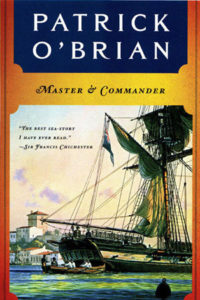 Why is it that a fourth re-reading of this magnificent story of the Napoleonic Wars seems even more delicious than the first time around? There are 21 novels in this series and I’ve embarked on another voyage. “I give you joy,” as these sailors say to each other.
Why is it that a fourth re-reading of this magnificent story of the Napoleonic Wars seems even more delicious than the first time around? There are 21 novels in this series and I’ve embarked on another voyage. “I give you joy,” as these sailors say to each other.
From listening to Locatelli’s C major quartet, that almost causes a duel, to the concluding words of acquittal in a naval court martial, we live life at sea with Jack Aubrey, the naval commander, but not quite yet a “Captain,” and the polymath physician and spy Stephen Maturin, an Irish-Catalan.
O’Brian uses a rich language that drives you to the dictionary. Ships and boats: frigate, ship-of-the line, sloop, long-boat, cutter, gig, jolly-boat, felucca, tartan, xebec, poluccas houario, barca-longa, bean-cod, cat, and herring-bus. Birds: upupa, epop (or hoopoe), ibis, mareotic grallatore. A flower: dianthus perfragans. An ant: tapinoma erraticum. Of an acquaintance, Maturin says: “I would not call him a gremial friend” (from the Latin, not a “close” friend).
And humor: a Frenchman sailed slowly “no doubt for fear of tripping over the lines of longitude.” Jack Aubrey trying to sound literate: “Alas, poor Borwick.” His sloop “the Sophie reeked of grilled sardines and fresh paint.” The sun shone “with idiot good humor.”
Or the two page delightful description of Maturin watching the mating of two praying mantises, the female then devouring the head and thorax of the male as the male ‘copulated on!” His conclusion: “You do not need a head, nor even a heart, to be all a female can require.”
On the word “death” in the English Articles of War, to be regularly read to the ship’s crew: “ . . . death had a fine, comminatory Leviticus ring, and the crew took a grave (my italics!) pleasure in it all. . . . “ I can hear O’Brian chuckling as he wrote that line.
Jack Aubrey is always urging speed: “There is not a minute to lose.” He repeats this counsel more than six times in this novel (and it is repeated in all the rest!)
And here is Maturin’s take on the human condition: “It seems to me that the greater mass of confusion and distress must arise from these less evident divergencies – the moral law, the civil, military, common laws, the code of honour, custom, the rules of practical life, of civility, of amorous conversation, gallantry, to say nothing of Christianity for those who practise it. All sometimes, indeed generally, at variance; none ever in an entirely harmonious relation to the rest; and a man is perpetually required to choose one rather than another perhaps (in his particular case) its contrary. It is as though our strings were each tuned according to a completely separate system – it is as though the poor ass were surrounded by four and twenty mangers.”
To which Jack Aubrey commented: “You are an antinomian.”
And Stephen Maturin replied: “I am a pragmatist.” A perfect description of the chaos two centuries later!
Finally, the author tossed a delightful tidbit my way, when Jack Aubrey said “ . . . how happy, felix, you would make me.” Yes, this Felix is basking in the delight of O’Brian’s words, looking forward to his fourth re-read of the remaining twenty novels.
Editor’s Note: ‘Master and Commander’ by Patrick O’Brian, is published by W. W. Norton & Co., New York 1990 (first published in UK 1970.)
 About the Author: Felix Kloman is a sailor, rower, husband, father, grandfather, retired management consultant and, above all, a curious reader and writer. He’s explored how we as human beings and organizations respond to ever-present uncertainty in two books, ‘Mumpsimus Revisited’ (2005) and ‘The Fantods of Risk’ (2008). A 20-year resident of Lyme, he now writes book reviews, mostly of non-fiction that explores our minds, our behavior, our politics and our history. But he does throw in a novel here and there. For more than 50 years, he’s put together the 17 syllables that comprise haiku, the traditional Japanese poetry, and now serves as the self-appointed “poet laureate” of Ashlawn Farms Coffee, where he may be seen on Friday mornings. His wife, Ann, is also a writer, but of mystery novels, all of which begin in a bubbling village in midcoast Maine, strangely reminiscent of the town she and her husband visit every summer.
About the Author: Felix Kloman is a sailor, rower, husband, father, grandfather, retired management consultant and, above all, a curious reader and writer. He’s explored how we as human beings and organizations respond to ever-present uncertainty in two books, ‘Mumpsimus Revisited’ (2005) and ‘The Fantods of Risk’ (2008). A 20-year resident of Lyme, he now writes book reviews, mostly of non-fiction that explores our minds, our behavior, our politics and our history. But he does throw in a novel here and there. For more than 50 years, he’s put together the 17 syllables that comprise haiku, the traditional Japanese poetry, and now serves as the self-appointed “poet laureate” of Ashlawn Farms Coffee, where he may be seen on Friday mornings. His wife, Ann, is also a writer, but of mystery novels, all of which begin in a bubbling village in midcoast Maine, strangely reminiscent of the town she and her husband visit every summer.